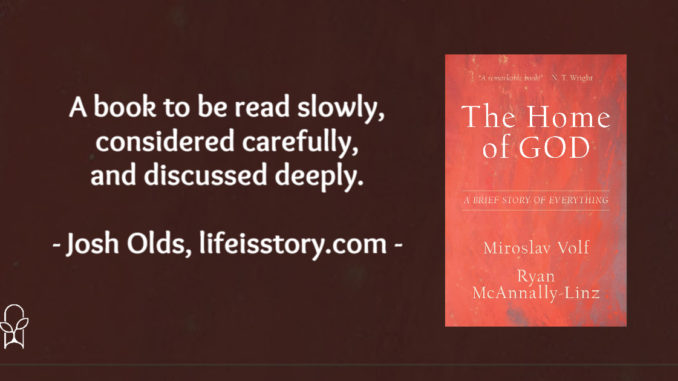
Also by this author: The End of Memory: Remembering Rightly in a Violent World
Published by Brazos Press on August 2, 2022
Genres: Academic, Non-Fiction, Theology
Buy on Amazon
Goodreads

We live in the midst of a crisis of home. It is evident in the massive uprooting and migration of millions across the globe, in the anxious nationalism awaiting immigrants in their destinations, in the unhoused populations in wealthy cities, in the fractured households of families, and in the worldwide destruction of habitats and international struggles for dominance. It is evident, perhaps more quietly but just as truly, in the aching sense that there is nowhere we truly belong.
In this moment, the Christian faith has been disappointingly inept in its response. We need a better witness to the God who created, loves, and reconciles this world, who comes to dwell among us.
This book tells the "story of everything" in which God creates the world as the home for humans and for God in communion with God's creatures. The authors render the story of creation, redemption, and consummation through the lens of God's homemaking work and show the theological fruit of telling the story this way. The result is a vision that can inspire creative Christian living in our various homes today in faithfulness to God's ongoing work.
In 2019, Miroslav Volf presented the University of Birmingham’s Cadbury Lectures, speaking on the topic of the world as God’s home. That content has been reworked with Ryan McAnnally-Linz into book form and released as The Home of God: A Brief Story of Everything. Central to the book’s thesis is that there is a crisis of homelessness—not just social, but existential. We, as humanity, are increasingly alienated from any sense of home. In some ways, this is integral to the Christian journey. We are pilgrims passing through to an eternal home. But in other ways, we are called to a pilgrimage toward a world in which God has made his home.
Those who have read Volf before can rest assured that this is quintessential Volf—rigorously academic, poignantly passionate, nuanced yet clear. Volf describes The Home of God as a systematic theology, though it is hardly such in the traditional meaning. Rather, it is systematic as a theological paradigm through which everything is viewed. Volf begins with the Exodus as the story of a homecoming—of God creating a home and a nation for an enslaved people. The book draws out themes of home that will eventually see full fruition at the end of the book of Revelation when God makes all things new.
From there, Volf moves to a discussion of the Gospel of John and the incarnation, about how God came to make his home among people—fulfilling a foreshadowing of His presence in the Tabernacle of the Exodus. This part of the book takes us through the Gospel as Jesus presents himself as God and what implications there are for God having come to dwell among us. The third part moves to an exploration of God’s Spirit making the world her home and talks about how Jesus, through the Spirit builds this idea of the church as a Christian family with the church as its home.
Finally, Volf moves into the eschatological, moving to Revelation and concluding with the words of John’s Revelation being something revealed: And I heard a loud voice from the throne saying, “Look! God’s dwelling place is now among the people, and he will dwell with them. They will be his people, and God himself will be with them and be their God. The only thing I would have liked to have seen added as a substantive discussion, something that truly would have made this “a brief history of everything” as the subtitle implied, would have been a discussion of Creation.
The Home of God is deep, immersive, and thoughtful. Volf and McAnnally-Linz force readers to reread Scripture with the view that God’s creation and His people were meant to be His home. This is drastically different from the typical, pop-culture, evangelical view of “I’ll fly away, O glory” and a God whose home is markedly separate from his creation. The result is a presentation of Creation as something much more valuable than we’ve often made it. The Home of God is a book to be read slowly, considered carefully, and discussed deeply.
